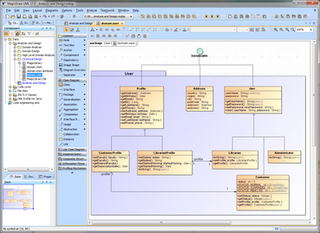Jakarta Enterprise Beans is one of several Java APIs for modular construction of enterprise software. EJB is a server-side software component that encapsulates business logic of an application. An EJB web container provides a runtime environment for web related software components, including computer security, Java servlet lifecycle management, transaction processing, and other web services. The EJB specification is a subset of the Java EE specification.

NetBeans is an integrated development environment (IDE) for Java. NetBeans allows applications to be developed from a set of modular software components called modules. NetBeans runs on Windows, macOS, Linux and Solaris. In addition to Java development, it has extensions for other languages like PHP, C, C++, HTML5, and JavaScript. Applications based on NetBeans, including the NetBeans IDE, can be extended by third party developers.

WebObjects is a Java web application server and a server-based web application framework originally developed by NeXT Software, Inc.
XForms is an XML format used for collecting inputs from web forms. XForms was designed to be the next generation of HTML / XHTML forms, but is generic enough that it can also be used in a standalone manner or with presentation languages other than XHTML to describe a user interface and a set of common data manipulation tasks.
Hibernate ORM is an object–relational mapping tool for the Java programming language. It provides a framework for mapping an object-oriented domain model to a relational database. Hibernate handles object–relational impedance mismatch problems by replacing direct, persistent database accesses with high-level object handling functions.
Apache Wicket, commonly referred to as Wicket, is a component-based web application framework for the Java programming language conceptually similar to JavaServer Faces and Tapestry. It was originally written by Jonathan Locke in April 2004. Version 1.0 was released in June 2005. It graduated into an Apache top-level project in June 2007.

Uniface is a low-code development and deployment platform for enterprise applications that can run in a large range of runtime environments, including mobile, mainframe, web, Service-oriented architecture (SOA), Windows, Java EE and .NET. Uniface is used to create mission-critical applications.
XMLBeans is a Java-to-XML binding framework which is part of the Apache Software Foundation XML project.
iBATIS is a persistence framework which automates the mapping between SQL databases and objects in Java, .NET, and Ruby on Rails. In Java, the objects are POJOs. The mappings are decoupled from the application logic by packaging the SQL statements in XML configuration files. The result is a significant reduction in the amount of code that a developer needs to access a relational database using lower level APIs like JDBC and ODBC.
The Spring Framework is an application framework and inversion of control container for the Java platform. The framework's core features can be used by any Java application, but there are extensions for building web applications on top of the Java EE platform. Although the framework does not impose any specific programming model, it has become popular in the Java community as an addition to the Enterprise JavaBeans (EJB) model. The Spring Framework is open source.

MagicDraw is a visual UML, SysML, BPMN, and UPDM modeling tool with team collaboration support. Designed for business analysts, software analysts, programmers, and QA engineers, this dynamic and versatile development tool facilitates analysis and design of object oriented (OO) systems and databases. It provides the code engineering mechanism, as well as database schema modeling, DDL generation and reverse engineering facilities.
Apache ObJectRelationalBridge (OJB) is an Object/Relational mapping tool that allows transparent persistence for Java Objects against relational databases. It was released on April 6, 2005.
Apache Empire-db is a Java library that provides a high level object-oriented API for accessing relational database management systems (RDBMS) through JDBC. Apache Empire-db is open source and provided under the Apache License 2.0 from the Apache Software Foundation.

Apache Pivot is an open-source platform for building rich web applications in Java or any JVM-compatible language. It is released under the Apache License version 2.0.
Versant Object Database (VOD) is an object database software product developed by Versant Corporation.
ObjectDB is an object database for Java. It can be used in client-server mode and in embedded mode.
MyBatis is a Java persistence framework that couples objects with stored procedures or SQL statements using an XML descriptor or annotations.
Oracle TopLink is a mapping and persistence framework for Java developers. TopLink is produced by Oracle and is a part of Oracle's OracleAS, WebLogic, and OC4J servers. It is an object-persistence and object-transformation framework. TopLink provides development tools and run-time functionalities that ease the development process and help increase functionality. Persistent object-oriented data is stored in relational databases which helps build high-performance applications. Storing data in either XML or relational databases is made possible by transforming it from object-oriented data.






